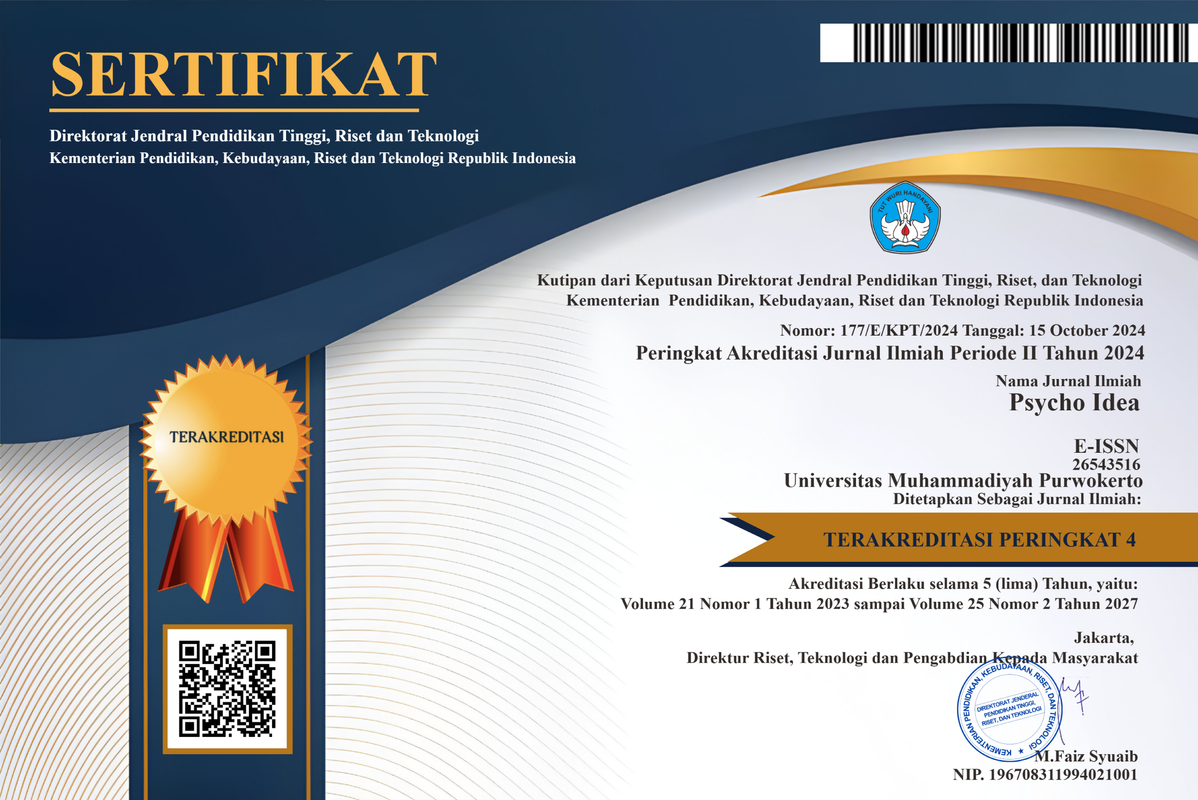HUBUNGAN ANTARA KONFORMITAS TERHADAP TEMAN SEBAYA DENGAN INTENSI MEROKOK PADA REMAJA PEREMPUAN DI SMA KESATRIAN 1 SEMARANG
DOI:
https://doi.org/10.30595/psychoidea.v7i2.189Abstract
Penelitian ini bertujuan untuk mengetahui hubungan antara konformitas terhadap teman sebaya dan intensi merokok pada remaja perempuan di SMA Kesatrian 1 Semarang. Penelitian ini dilakukan terhadap 181 siswi tingkat X dan XI yang diambil dengan teknik Stratified Cluster Random Sampling. Pengumpulan data dilakukan dengan menggunakan skala Konformitas Terhadap Teman Sebaya yang terdiri dari 30 aitem (α=0,878), dan skala Intensi Merokok yang terdiri dari 29 aitem (α=0,930). Analisis data menggunakan analisis regresi sederhana, menghasilkan koefisien korelasi (rxy) sebesar 0,404 (p<0,05), yang menunjukkan hubungan positif yang signifikan antara konformitas terhadap teman sebaya dengan intensi merokok, sehingga hipotesis penelitian ini dapat diterima. Efektifitas regresi konformitas terhadap teman sebaya adalah sebesar 0,164 yang menunjukkan bahwa sumbangan efektif konformitas terhadap teman sebaya bagi intensi merokok remaja perempuan adalah sebesar 16,4%, jadi masih ada 83,6% faktor lain yang mempengaruhi intensi merokok subjek yang tidak diungkap dalam penelitian ini. Kata Kunci: konformitas terhadapReferences
Ajzen, I. 1991. Attitudes, personality, and behavior. Buckingham: Open University Press.
Baron, R.A., Byrne, B. 2003. Social psychology 10th ed. New York: Allyn and Bacon, Inc.
___________________. 1991. Social psycology : A social psychology approach 4th ed. Massachusetts: Allyn and Bacon, Inc.
Bishop, G. D. 1994. Health psychology : Integrating mind and body. Singapore: Allyn and Bacon.
De Vries, H., Reubsaet, A., Hoving, C. 2007. Predictors of smoking stage transitions for adolescent boys and girls. Preventive Medicine. 44, 485-489.
Fuhrmann, B. S. 1990. Adolescence adolescent. Illinois: A Division of Scott Foresman and Company.
Hurlock, E.B. 2003. Perkembangan suatu pendekatan sepanjang rentang kehidupan. Alih Bahasa : Istiwidiyanti. Jakarta: Erlangga.
Komalasari, D., Helmi, A.F. 2000. Faktor-faktor penyebab perilaku merokok pada remaja. Jurnal Psikologi Universitas Gadjah Mada Vol.3 No.1 h.37-47.
Lips, H. M. 2005. Sex and gender: An introduction. New York: McGraw-Hill, Inc.
Marks, D. F., Murray, M., Evans, B., Willig, C. 2000. Health psychology theory, research, and practice. London: Sage Publication, Ltd.
McCool, J., Cameron, L., Petrie, K., Robinson, E. 2003. Smoking behavior and expectations among Auckland adolescents. The New Zealand Medical Journal 116, 1176, 1-9.
Rachmi, N. 2005. Intensi perilaku merokok pada remaja awal ditinjau dari konformitas terhadap teman tebaya di SMPN 5 Semarang. Skripsi (tidak diterbitkan). Semarang: Fakultas Psikologi Universitas Diponegoro.
Richmond-Abbott, M. 1992. Masculine and feminine: Gender roles over the Life cycle. New York: McGraw-Hill, Inc.
Santrock, J. W. 1995. Life-Span development jilid II edisi kelima. Jakarta: Erlangga.
Sarafino, E. P. 1990. Health psychology: Biopsychosocial interaction. New York: John Willey and Sons, Inc.
Urberg, K. A., Degirmencioglu, S. M., Pilgrim, C. 1997. Close friend and group influence on adolescent cigarette smoking and alcohol use. Journal of Developmental Psychology 33, 5, 834-844.
Suara Merdeka, h.1. (2008, 25 Agustus). “MUI Harus Tegas Keluarkan Fatwa Haram Merokok.”
Tempo, h.26. (2008, 6 Oktober), †Iklan Rokok Versus Merokokâ€
Kompas, (2008, 7 Juni). â€Jumlah Perokok Pemula Meningkat â€.
Downloads
Published
Issue
Section
License
Authors published in this journal agree to the following terms:
- The copyright of each article is retained by the author (s) without restrictions
- The journal allows the author(s) to retain publishing rights without restrictions
- The author grants the journal the first publication rights with the work simultaneously licensed under the Creative Commons Attribution License, allowing others to share the work with an acknowledgment of authorship and the initial publication in this journal.
- Authors may enter into separate additional contractual agreements for the non-exclusive distribution of published journal versions of the work (for example, posting them to institutional repositories or publishing them in a book), with acknowledgment of their initial publication in this journal
- Authors are permitted and encouraged to post their work online (For example in the Institutional Repository or on their website) before and during the submission process, as this can lead to productive exchanges, as well as earlier and larger citations of published work
- Articles and all related material published are distributed under a Creative Commons Attribution-4.0 International Public License (CC - BY 4.0).
License
Psycho Idea is licensed under a Creative Commons Attribution- 4.0 International Public License (CC - BY 4.0).
You are free to :
Share — copy and redistribute the material in any medium or format
Adapt — remix, transform, and build upon the material for any purpose, even commercially











